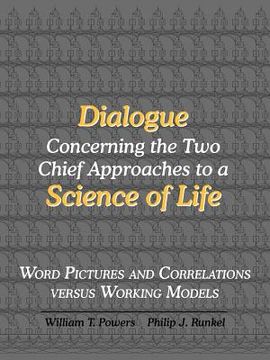Reseña del libro "dialogue concerning the two chief approaches to a science of life (en Inglés)"
This actual correspondence between two lucid gentlemen introduces the first ever comprehensive, technically sound, demonstrable explanation for behavior: What it is, how it works, what it accomplishes. Simply put: Living organisms-people included-are control systems, and act to experience what they want to experience. You know that is what you do, and that is what control systems do. Perceptual Control Theory (PCT) explains how living things work. PCT lays a foundation for psychology to become a science based on clear principles no less reliable than principles employed in the physical and engineering sciences. Once you understand PCT, you interpret your experiences in light of the new explanation and your outlook changes. Among other things, you will understand the nature of conflict, and how best to resolve it. Articles, tutorials, and simulation programs are available at the publisher's website, www.livingcontrolsystems.com. ABOUT THE AUTHORS WILLIAM T. POWERS has been developing PCT for over 50 years and has published numerous articles and books from 1957 through 2009. PHILIP J. RUNKEL was Professor Emeritus of Psychology and Education at the University of Oregon. FROM COMMENTS ON THIS VOLUME "Bill Powers is one of the clearest and most original thinkers in the history of psychology. For decades he has explored with persistence and ingenuity the profound implications of the simple idea that biological organisms are control systems. His background in engineering allowed him to avoid many of the traps that have victimized even the best psychologists of the past. I believe his contributions will stand the test of time." Henry Yin, Professor of Psychology & Neuroscience Duke University, NC "Bill Powers' work in the 20th century will prove to be as important for the life sciences as Charles Darwin's work in the 19th century. By the time this notion has become common knowledge, historians of science will be very happy with this correspondence between two giants." Frans X. Plooij, Director, International Research-institute on Infant Studies, The Netherlands "...The result [of applying PCT] was a level of plant performance that had never been attained before. The plant won numerous accolades for on time delivery, line linearity, and quality. Also, teamwork between departments, which in the past had been less than ideal, improved significantly." Jim Soldani, Former Director of Systems Manufacturing, Intel "... It is often difficult for therapists to grasp the notion that there can be a precise, empirical and quantitative model of purposive, humanistic psychology-but here it is." Warren Mansell, Senior Lecturer, University of Manchester, UK "...These characteristics of PCT-its scope, its rejection of IV-DV hand-waving and 'models' that don't work, its demand for hard-science specificity and for correlations near 100%-can make it a hard sell. Those who wish to curry favor among today's makers and breakers of reputation might well steer clear. The essay Three "Dangerous" Words in Part II will tell you why. But those who want to do something of lasting value should pay close attention. Our colleague Phil Runkel has gone this way before us under the guidance of our mentor Bill Powers, and their 22 years of wise, articulate, witty correspondence lays out bright lights and signposts for our benefit." Bruce Nevin, Program Manager & Information Architect, Cisco Systems Inc.

